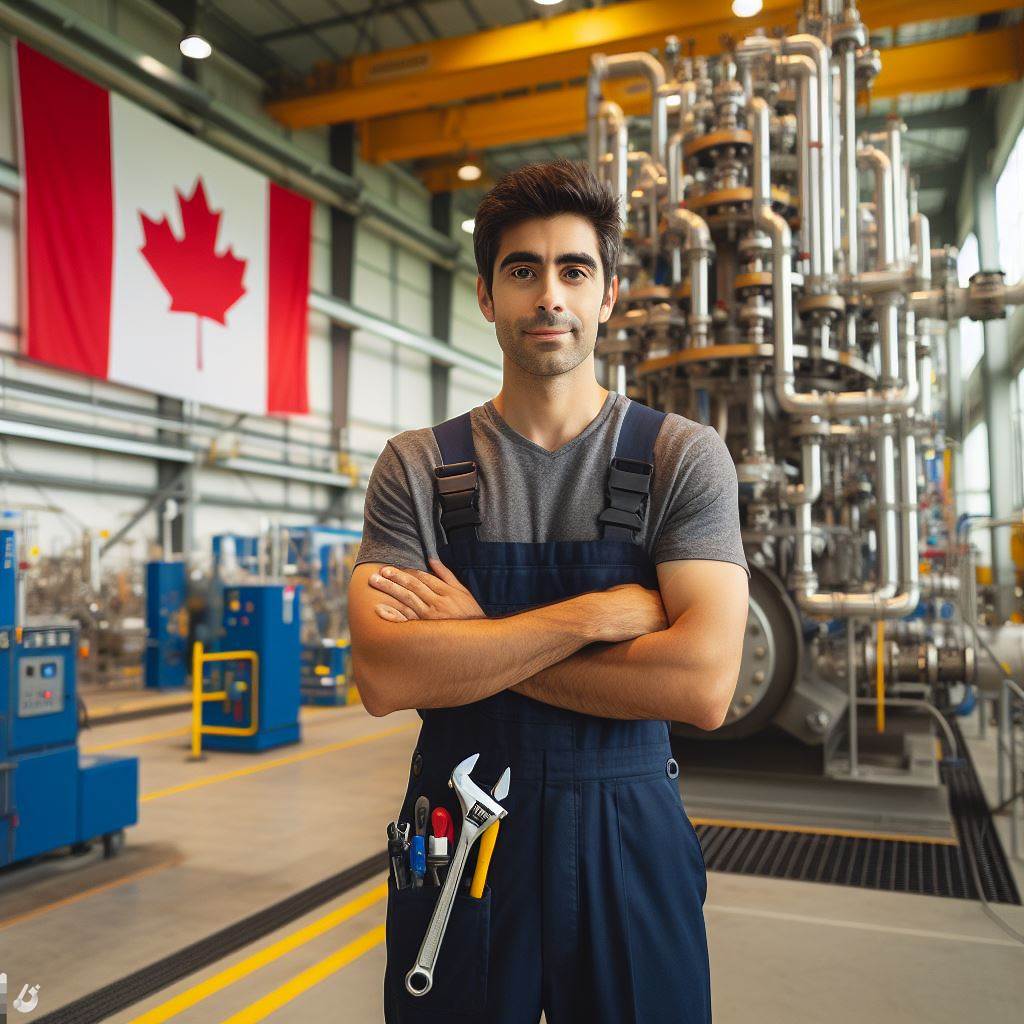Introduction
Welcome to our blog post on plumber licenses in Canada, where we will provide a detailed guide to this important topic.
Plumber licenses in Canada play a crucial role in ensuring the safety and quality of plumbing work.
They demonstrate that plumbers have the necessary skills and knowledge to perform their jobs effectively and protect the public’s health and safety.
In this blog post, we will delve into the various aspects of plumber licenses in Canada.
We will explore the requirements for obtaining a license, the benefits of being licensed, and the regulations that govern the plumbing profession in different provinces.
We will also discuss the process of license renewal and the consequences of working without a license.
Furthermore, we will address common misconceptions and provide tips for aspiring plumbers.
Finally, we will conclude with a summary and provide additional resources for those seeking more information on this topic.
We hope that this comprehensive guide will serve as a valuable resource for anyone interested in understanding the significance of plumber licenses in Canada and the associated regulations.
Let’s dive in and explore the world of plumber licenses together!
What is a plumber license?
Definition and explanation of what a plumber license entails
A plumber license is an official document that certifies an individual’s ability to practice plumbing.
To obtain a plumber license in Canada, individuals must undergo rigorous training and pass various examinations.
Importance of having a license to practice plumbing in Canada
Having a plumber license is essential as it demonstrates a plumber’s competence and adherence to industry standards.
With a license, plumbers gain credibility and trust from clients who seek professional and qualified services.
A plumber license protects the public by ensuring that only qualified individuals perform plumbing work.
In Canada, the licensing process varies by province, with each province having its own specific requirements.
To obtain a plumber license, individuals must first complete a certified plumbing apprenticeship program.
During the apprenticeship period, aspiring plumbers gain practical experience under the guidance of experienced professionals.
Apprentices must complete a predetermined number of on-the-job training hours before proceeding to the next level.
After completing the apprenticeship program, individuals must pass an examination to become a journeyman plumber.
The journeyman plumber license allows individuals to work independently but still under the supervision of a master plumber.
To become a master plumber, individuals must accumulate more experience and pass a higher-level examination.
With a master plumber license, individuals can operate their own plumbing businesses and supervise other plumbers.
Having a license not only ensures the quality of work but also helps plumbers command higher wages.
Licensed plumbers often receive preference for job opportunities and contracts due to their professional credentials.
Unlock Your Career Potential
Visualize a clear path to success with our tailored Career Consulting service. Personalized insights in just 1-3 days.
Get StartedIt is crucial for plumbers to maintain their licenses by renewing them periodically and satisfying continuing education requirements.
Without a valid license, plumbers may face legal consequences and restrictions in their practice.
Clients should always verify that the plumber they hire has a valid license and insurance coverage.
Hiring a licensed plumber ensures the delivery of high-quality work that meets safety and regulatory standards.
In short, a plumber license in Canada is a testament to an individual’s expertise and proficiency in the trade.
It signifies that the plumber has undergone proper training and possesses the necessary skills to work safely and effectively.
Having a license not only benefits plumbers by increasing their job prospects and income potential but also safeguards the public by ensuring the delivery of professional and reliable plumbing services.
Read: Top Canadian Plumbing Schools & Courses for 2024
Different types of plumber licenses in Canada
Overview of various types of licenses available
In Canada, there are different types of plumber licenses that individuals can obtain based on their qualifications and experience.
These licenses allow plumbers to legally practice their trade and ensure that they meet the necessary standards of quality and safety.
Understanding the different types of licenses available, their requirements, and differences is essential for aspiring plumbers and consumers seeking plumbing services.
Explanation of the differences and requirements for each type
1. Journeyman Plumber License
- Requires completion of an apprenticeship program or relevant trade school training.
- Demonstrates a certain level of experience and knowledge in plumbing.
- Usually requires passing a licensing exam to showcase competence.
- Allows plumbers to work independently and carry out plumbing tasks without direct supervision.
2. Master Plumber License
- Requires a specific number of years of experience as a journeyman plumber.
- Involves passing a master plumber exam to demonstrate advanced skills and expertise.
- Allows plumbers to work on complex projects, oversee apprentices, and obtain permits for larger jobs.
- Often required for the establishment of plumbing businesses or seeking leadership positions.
3. Restricted or Limited Plumber License
- Imposes limitations on the types of plumbing work that can be performed.
- Usually applicable to plumbers who specialize in specific areas, such as backflow prevention or gas systems.
- Requires certification and additional training to ensure competence in the restricted field.
- Allows plumbers to work on specialized projects within their designated area of expertise.
4. Apprentice Plumber License
- Granted to individuals who are actively learning the plumbing trade through an apprenticeship program.
- Involves working under the supervision of a journeyman or master plumber to gain practical experience.
- Requires registration with the relevant provincial apprenticeship authority.
- Permits apprentices to refine their skills and accumulate the necessary hours towards becoming a journeyman plumber.
5. Interprovincial Red Seal Certification
- Not a license per se, but an additional qualification that can enhance a plumber’s credentials.
- Recognizes a plumber’s competency and allows for mobility between provinces.
- Involves passing an interprovincial exam to demonstrate a standardized level of skill and knowledge.
It is important to note that each province in Canada may have its own specific licensing requirements and regulations for plumbers.
Aspiring plumbers should consult the regulatory bodies in their respective provinces for detailed information on the licensing process.
The requirements for obtaining plumber licenses vary, but typically include a combination of education, apprenticeship hours, practical experience, and successful completion of licensing exams.
Plumbers also need to meet certain character and background checks to ensure public safety and trust.
By obtaining the appropriate plumber license, professionals ensure that they are legally qualified to offer their services and provide customers with peace of mind.
Consumers should always verify the licensing status of a plumber before hiring them to ensure they are working with a qualified and trustworthy professional.
In fact, plumber licenses in Canada come in various types, each with its own set of requirements and responsibilities.
Journeyman, master, restricted, and apprentice licenses, as well as the interprovincial Red Seal certification, enable plumbers to work at different levels of expertise and specialization.
It is crucial for aspiring plumbers to understand the licensing process and for consumers to recognize the importance of hiring licensed professionals.
Read: Networking for Electricians in Canada: Tips
Licensing Process
- Research the requirements for obtaining a plumber license in the province or territory you wish to work in.
- Complete a plumbing apprenticeship program, which typically takes four to five years.
- Gather the necessary documentation, including a high school diploma or equivalent.
- Obtain a letter of employment from a certified plumber who can vouch for your experience.
- Compile any additional qualifications, such as trade school certificates or relevant work experience.
- Prepare for the licensing exam by studying plumbing codes, regulations, and industry best practices.
Step-by-step guide on how to obtain a plumber license in Canada
- Begin by contacting the local plumbing authority or regulatory body in your desired province/territory.
- Enroll in a recognized plumbing apprenticeship program, which combines classroom instruction and on-the-job training.
- Complete the required number of apprenticeship hours, typically ranging from 6,000 to 9,000 hours.
- Obtain the necessary documentation, including your high school diploma or equivalent.
- Submit an application to the plumbing authority, providing proof of your apprenticeship completion and qualifications.
- Pay the required application fees and wait for your application to be processed.
- Upon approval, schedule and pass the plumbing licensing exam administered by the regulatory body.
- Once you pass the exam, pay the licensing fee and receive your official plumber license.
Documentation and qualifications needed
To apply for a plumber license in Canada, you will need the following:
- High school diploma or equivalent.
- Completion certificate from a recognized plumbing apprenticeship program.
- Letter of employment from a certified plumber, outlining your experience in the field.
- Trade school certificates or any additional qualifications related to plumbing.
- Updated resume outlining your skills and relevant work experience.
- Copies of any professional development courses or workshops you have attended.
Exam requirements and preparation
- The plumbing licensing exam typically consists of multiple-choice questions and practical assessments.
- Study various resources such as plumbing code books, industry textbooks, and online tutorials.
- Attend exam preparation courses or workshops that focus on the topics covered in the exam.
- Take practice exams to familiarize yourself with the format and style of questions.
- Review any areas where you feel less confident and seek additional resources or guidance if needed.
- Develop strong problem-solving and critical thinking skills to excel in the practical assessments.
- Prioritize time management during the exam to ensure you can answer all questions within the allocated time.
In essence, obtaining a plumber license in Canada requires careful preparation and adherence to specific guidelines.
By following the step-by-step process, gathering the necessary documentation, and adequately preparing for the licensing exam, you can increase your chances of achieving your goal.
Remember to stay updated on plumbing codes and regulations to maintain your license and provide quality service to clients.
Read: Troubleshooting Tips for Rookie Electricians

Provincial variations
How licensing requirements may vary by province
In Canada, plumber licenses can vary by province, with different requirements and additional criteria needed.
Provincial variations in plumber licenses
- Licensing requirements for plumbers may vary depending on the province they are practicing in.
- Each province has its own regulatory body responsible for issuing and maintaining plumber licenses.
- These regulatory bodies set specific criteria, exams, and education requirements for obtaining a license.
Licensing requirements by province
British Columbia
- In BC, plumbers must complete either a four-year apprenticeship program or a recognized equivalent.
- They need to pass the Interprovincial Red Seal Exam to obtain their license.
Alberta
- Plumbers in Alberta must complete a four-year apprenticeship program or equivalent training.
- They also need to pass the Interprovincial Red Seal Exam to become licensed.
Ontario
- In Ontario, plumbers are required to complete a five-year apprenticeship program or an approved equivalent.
- They must pass the Certificate of Qualification Exam to obtain their license.
Quebec
- Plumbers in Quebec must hold a vocational diploma or a compulsory trade certificate.
- They also need to pass a practical and theoretical exam conducted by the Corporation des maîtres mécaniciens en tuyauterie du Québec.
Manitoba
- In Manitoba, plumbers must complete a four-year apprenticeship program or equivalent training.
- They need to pass the Interprovincial Red Seal Exam and the Manitoba Licensing Exam.
Specific differences and additional requirements in certain provinces
Saskatchewan
- Plumbers in Saskatchewan must complete a four-year apprenticeship program or equivalent training.
- They need to pass the Interprovincial Red Seal Exam and the Saskatchewan Plumbing Licensing Exam.
Nova Scotia
- In Nova Scotia, plumbers must complete a four-year apprenticeship program or equivalent training.
- They need to pass the NS Trade Qualifier Exam and the Red Seal Exam.
New Brunswick
- Plumbers in New Brunswick must complete a four-year apprenticeship program or equivalent training.
- They need to pass the New Brunswick Plumber’s Exam.
Newfoundland and Labrador
- In Newfoundland and Labrador, plumbers must complete a four-year apprenticeship program or equivalent training.
- They need to pass the Interprovincial Red Seal Exam and the Newfoundland and Labrador licensing exams.
Prince Edward Island
- Plumbers in PEI must complete a four-year apprenticeship program or equivalent training.
- They need to pass the PEI Provincial Licensing Exam.
Importance of provincial variations in plumber licenses
- Provincial variations ensure that plumbers are trained and qualified to meet the specific needs and standards of each province.
- These variations help maintain the safety and quality of plumbing work across the country.
- They ensure that plumbers possess the necessary skills and knowledge to handle different provincial regulations and codes.
In brief, plumber licenses in Canada vary by province, with each province having its own licensing requirements and additional criteria.
It is crucial for plumbers to understand and comply with these variations to ensure they are properly licensed and qualified to carry out their work.
Read: Canadian Electricians: Union vs Non-Union
Benefits of having a Plumber License
Advantages for licensed plumbers in terms of professionalism and reputation
- A licensed plumber demonstrates their commitment to their profession and upholding industry standards.
- Having a license instills trust and confidence in customers, knowing they are hiring a qualified professional.|
- Being licensed allows plumbers to join professional organizations and access valuable networking opportunities.
- Licensed plumbers can showcase their credentials, enhancing their professional reputation in the industry.
- With a license, plumbers gain access to specialized training and educational opportunities to further enhance their skills.
Increased job opportunities and higher earning potential
- Many plumbing companies and contractors require plumbers to have a valid license.
- Having a license opens up opportunities to work in larger and more prestigious projects.
- Licensed plumbers have a competitive edge when it comes to job applications and promotions.
- Clients are often willing to pay higher rates for licensed plumbers due to their expertise and professionalism.
- With a license, plumbers can take on more complex and specialized tasks, leading to higher earning potential.
In a nutshell, obtaining a plumber license in Canada comes with various benefits for professionals in the field.
Apart from the advantages related to professionalism and reputation, licensed plumbers also enjoy increased job opportunities and the possibility of earning a higher income.
It is clear that acquiring a license is a wise investment for plumbers looking to excel in their careers.
Maintaining and Renewing a Plumber License
The Periodic Renewal Process
- Plumbers in Canada are required to maintain and renew their licenses periodically.
- The specific renewal process varies depending on the province or territory in which the plumber is licensed.
- Typically, plumbers are required to submit an application for renewal and pay a renewal fee.
- The renewal period is usually every one to three years, depending on the jurisdiction.
- Plumbers must ensure that they renew their license before it expires to continue practicing legally.
Continuing Education Requirements to Ensure Up-to-Date Skills and Knowledge
- In addition to the renewal process, plumbers are often required to fulfill continuing education requirements.
- These requirements aim to ensure that plumbers maintain up-to-date skills and knowledge in their field.
- Continuing education courses can cover topics such as new plumbing techniques and technologies, safety protocols, and building codes.
- The number of continuing education hours required can vary depending on the jurisdiction.
- Plumbers may need to attend workshops, seminars, or online courses to meet these requirements.
- Continuing education not only helps plumbers stay updated but also enhances their professionalism and reputation within the industry.
- Some provinces or territories may have specific approved providers for continuing education programs.
- Plumbers should keep records of their completed courses and certifications to provide proof of compliance during license renewals.
Benefits of Maintaining and Renewing a Plumber License
- By maintaining and renewing their licenses, plumbers abide by the legal requirements set by their jurisdiction.
- A valid license provides assurance to clients that the plumber has met certain standards and possesses the necessary skills.
- Renewing a license demonstrates a commitment to professionalism and ongoing education.
- Plumbers who maintain their licenses have access to a broader range of job opportunities.
- Licensed plumbers often earn higher wages compared to unlicensed individuals in the same profession.
- Maintaining a license ensures that plumbers are aware of any changes in regulations or industry practices.
- Licensed plumbers can benefit from networking opportunities and professional development resources provided by industry associations
- Ultimately, renewing a plumber license helps protect public safety and ensures quality workmanship in the plumbing industry.
In summary, maintaining and renewing a plumber license is crucial for professional plumbers in Canada.
Through the periodic renewal process and continuing education requirements, plumbers can keep their skills up to date and enhance their professionalism.
By adhering to these requirements, licensed plumbers uphold industry standards, gain job opportunities, and contribute to public safety.
Conclusion
Obtaining a plumber license in Canada is crucial for various reasons.
It ensures that plumbers have the necessary skills and knowledge to provide high-quality services while also prioritizing public safety.
By obtaining a license, plumbers gain numerous benefits such as increased job opportunities, higher earning potential, and professional recognition within the industry.
For aspiring plumbers, it is essential to understand and fulfill the necessary licensing requirements.
This includes completing the required education and apprenticeship programs, passing the licensing examination, and meeting any additional provincial or territorial requirements.
While the process may seem challenging, it is important to stay motivated and dedicated to achieving the required licenses.
The efforts spent on obtaining a plumber license in Canada will pay off in the long run, leading to a rewarding and successful career in the plumbing industry.




